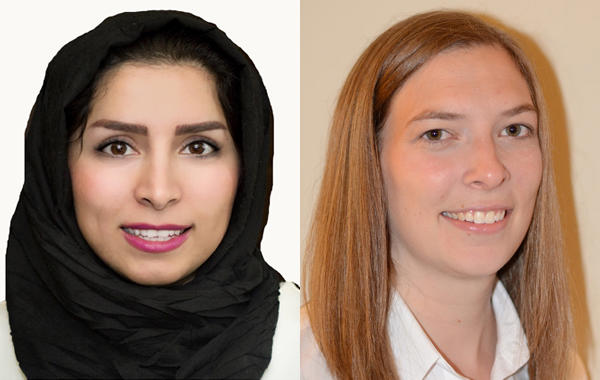Nov. 17, 2022
New Canada Research Chair takes community-first approach to well-being of Indigenous youth

Dr. Jennifer Markides, PhD’20, believes that for her scholarly work with Indigenous communities in Alberta to be successful, she must recognize and honour the expertise held in those communities. Accordingly, the recently named SSHRC Tier 2 Canada Research Chair (CRC) of Indigenous Youth Wellbeing and Education places respect and reciprocity at the core of her practice.
“I am committed to earning trust and maintaining ethical research relationships. I enter the work with humility and a goal of providing service in some way,” says Markides. “I also bring a keen interest in the holistic well-being of youth and know that education needs to reflect the interests, identities and communities of the students.”
To meet these needs, Markides, who is a member of the Métis Nation of Alberta and an assistant professor in the Werklund School of Education and Faculty of Social Work, is partnering with the Peace Wapiti, Fort Vermilion and High Prairie School Divisions to examine the educational experiences of Indigenous students and develop context-specific and culturally responsive school-based programming.
“For too long, Indigenous youth have been educated within colonizing institutions. Systems of education need to take a proactive role in addressing the well-being needs of youth in schools,” says Markides, a member of the Alberta Children's Hospital Research Institute.
Three new Canada Research Chairs named, one renewed
Markides is one of three UCalgary scholars to be named new CRCs by the federal government this week. Dr. Hadis Karimipour PhD, associate professor in the Schulich School of Engineering, and Dr. Erica Myers, PhD, associate professor in the Faculty of Arts, were also named. Dr. Naser El-Sheimy, PhD, professor in the Schulich School of Engineering, has had his CRC renewed for a second seven-year term.
“It’s my pleasure to congratulate our new and renewed CRCs,” says Dr. William Ghali, vice-president (research). “These four deserving scholars are creating new knowledge, training the next generation of leaders, and pursuing research that will improve quality of life for Canadians while strengthening our position of international leadership in their fields. I look forward to all that they will achieve.”
Community collaborations
The Working Together in Decolonization and Reconciliation professional learning series is one of several initiatives Markides is facilitating.
The online and in-person sessions brought together Indigenous Elders and community members, Werklund School academics and the Peace Wapiti Indigenous Education Service Team for discussions about Indigenous pedagogies, well-being and education as well as terminology and relationship building. The role educators can play in disrupting oppressive and re-colonizing narratives was also explored.
“While we realize that educators and administrators bring the learning from the series to their positions in a variety of ways, we are thrilled to see that Indigenous education and values continue to be prioritized within the Peace Wapiti Public School Division,” says Markides. “The Indigenous Education Services team is in high demand and receives the full support of the school division leadership. It is a clear example of strong, visionary leadership committed to seeking truth and supporting reconciliation.”
In addition to this project, Markides is working with two Fort Vermilion K-12 schools to identify and implement educational experiences that reflect and reinforce the students’ cultural identities, well-being and future goals. The schools have an approximately 95% Indigenous student population and the research is being carried out with guidance from Beaver First Nation Chief and Council and the Métis Local President and Elders.
Assessing outcomes
How will Markides measure the success of these undertakings?
“For me, any recognition of success in this work will come from the Indigenous communities and the youth. They will determine if we have done good work, honoured their contributions, better met their needs, and supported them in attaining their goals.”
Markides adds that it may take generations for the impact of these endeavours to be fully realized, but that it is the most important work she can imagine doing. She is also appreciative of her new post as research chair and the opportunity it will afford her to continue her collaborations with Indigenous communities and school boards.
“Earning this position is a dream come true. I am not the leader in this work, but a facilitator working alongside the community partners to see their priorities being addressed. We are taking bold steps to make change in real time so that the youth feel that their voices have been heard and respected. Our work is for them.”

Hadis Karimipour, left, and Erica Myers
Arts, Schulich researchers join prestigious program
Dr. Hadis Karimipour, Ph.D., associate professor in the Department of Electrical and Computer Engineering in the Schulich School of Engineering, is an internationally acclaimed researcher focused on the security of large-scale cyber-physical systems. As a Tier 2 CRC in Secure and Resilient Cyber-Physical Systems, Dr. Karimipour will develop artificial intelligence (AI)-aided tools for intelligent condition monitoring, cyber threat hunting and detection, threat prediction, and threat mitigation to protect Canada’s critical infrastructure. Her research aligns with Canada's Cyber Security Strategy and the National Strategy and Action Plan for Critical Infrastructure to build a safer, more secure and more resilient Canada.
Dr. Erica Myers, PhD, associate professor in the Department of Economics in the Faculty of Arts, is an emerging research leader in the field of environmental and energy economics. As a tier 2 CRC in Environmental, Energy and Resource Economics, Myers will seek new evidence on the design and performance of energy conservation programs. Her work will provide important guidance on how to improve consumers' appliance efficiency decisions. She will also help develop the Canadian Electricity Policy Research Network (CEPRN) to bring researchers and policymakers together for knowledge exchange and dissemination.

Naser El-Sheimy
Dr. Naser El-Sheimy, PhD'96, professor in the Department of Geomatics Engineering in the Schulich School of Engineering, will continue his work as a Tier 1 CRC in Geomatics Multi-Sensor Systems. El-Sheimy’s research expertise includes geomatics multi-sensor systems, GPS/INS integration, and mobile mapping systems.




